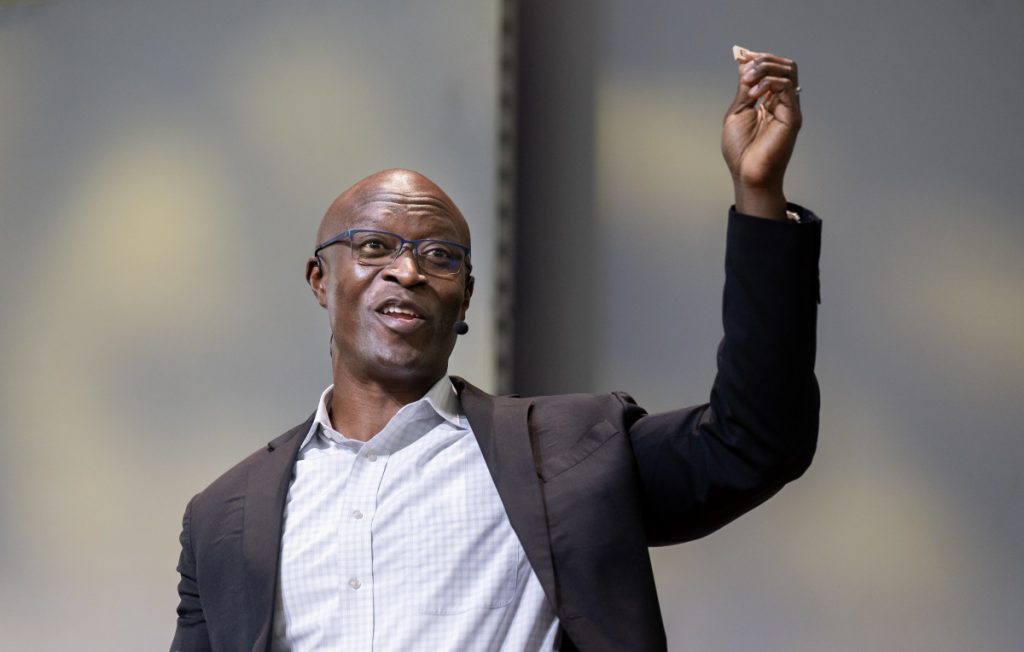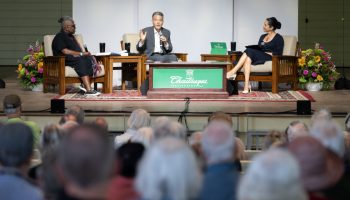
Conrad Tucker, director of CMU-Africa and commissioner of the U.S. Chamber of Commerce Artificial Intelligence Commission on Competitiveness, Inclusion, and Innovation, uses Scrabble to explain generative AI during his lecture Tuesday in the Amphitheater.
What do Scrabble and artificial intelligence have in common? Conrad Tucker posed this question at the outset of his lecture, asking for audience engagement to make a point that representation is vital for collective decision making. In both Scrabble and AI, data is put together in a way that makes sense, and there is always an ultimate decider — order out of chaos.
Tucker brought a mechanical engineer’s perspective to the discussion on AI, but as it moves into the mainstream, everyone needs an understanding of the technology, engineering degree or not.
“This idea of artificial intelligence only being for engineers or computer scientists: No,” Tucker said. “Artificial intelligence impacts us all, so the collective intelligence of the feedback provided to these AI models should be representative of humanity.”
Tucker is a professor of mechanical engineering at Carnegie Mellon University, where he is also director of CMU-Africa, and a commissioner for the U.S. Chamber of Commerce Artificial Intelligence Commission on Competitiveness, Inclusion, and Innovation. He spoke Tuesday in the Amphitheater as part of the Chautauqua Lecture Series Week Two theme “The AI Revolution.”
Tucker pointed to the Amp screens above him, and asked the audience what they saw. Most said an apple, but some said a picture of an apple. This demonstrated his point that “if we are not aligned, then the machines are just going to replicate what feedback we provide for them.”
In creating AI, engineers attempt to replicate the biological process of how humans observe data, like the apple, and what happens when we classify that data; but what Tucker found in his work is that “we are nowhere close to replicating the efficiency of the brain or the way the brain processes data.” One way AI classifies data is through a framework called Generative Adversarial Networks, GANs, in which two models, the generator and the discriminator, respectively gather data and determine what’s real.
“This Generative Adversarial Network is how this model learns — you generate and then you evaluate, generate then evaluate,” Tucker said, noting the speed at which AI has progressed.
Many tech leaders have predicted that today’s workforce should prepare to work hand-in-hand with AI, Tucker said. He emphasized three fields — teaching, research and development, and society — impacted by AI.
Tucker presented a hopeful picture of how AI will further transform education through personalization. For example, AI can design a lesson around students’ interests, like cars, arts and dancing, or sports, to increase engagement.
“We know that we have diverse interests and learning experiences,” Tucker said. “What if we don’t want to lose students because of the mismatch in the context and we have a scenario where AI is able to generate contexts that are specific to each learner? … Can we customize the delivery of knowledge using AI so that we don’t lose students because of context?”
Referencing Claude Shannon’s theory of communication and how it laid the foundation for many technological advancements in AI, Tucker highlighted how language can be a barrier for delivering information.
“You have a source … you have the destination … and you have the concept that you are trying to communicate,” he said. “… What happens in education is everything in the middle, the medium — maybe it’s the Powerpoint slides — the language, all of these things get in the way of delivering information.”
Essentially, there is opportunity to “leverage these AI models to diversify the context in which education could be delivered” to reach learners in a way that suits them, and “this is a game changer.”
As education leads to these many technological advances, that in turn leads to research and development. Computer-aided design tools create many different types of geometries using a collection of interconnected points; one could design a plane this way. Or, really, design anything.
“This could serve as a starting point from which human designers then refine new ideas and new designs,” Tucker said. “This could enhance the U.S. global competitiveness in AI where our engineers and designers are able to come up with technologies at a much faster pace with the assistance of AI.”
As AI models attempt to process information to predict what happens in reality, engineers evaluate the security of these models, as insignificant changes could have significant, even catastrophic, effects. The simulation needs to be as close as possible to reality, as “we’re no longer at the sci-fi stage of ‘here’s an AI model and all the AI model can do is generate text.’ … AI has broad capabilities that try to mimic all sorts of different human intelligence.”
Just this year, Tucker said, the U.S. Air Force retrofitted an F-16 with an AI copilot “to test whether or not these systems can actually maneuver and perform in very challenging situations like dogfights,” Tucker said. This ultimately, can save lives.
Engineers and scientists are becoming more motivated to actively participate on the policy side, Tucker said. The U.S. Chamber of Commerce AI Commission’s mandate “was to engage with academia, industry and government to ensure that the way that AI is designed, the way that AI evolves, has all of us here represented in the collective decision-making of the U.S. and the world,” he said.
This year, the head of the International Monetary Fund predicted — and this is an estimate, Tucker said — that AI will impact 60% of advanced economies. That’s “60% of our jobs,” Tucker said.
Working to make sure AI impacts lives in a good way means representation is vital. Social media is one of our largest-growing vulnerabilities, Tucker said, showing a graph that illustrated a disparity in Twitter posts across the United States at any given time. The east coast and west coast were filled with tweets, but very few were illustrated in the midwest.
“We can see here that even in the U.S., the representation of data is not uniform,” he said. “How do we ensure that the collective voices of citizens … are just as represented in how AI is shaped and how AI evolves?”
Information on social media can spread rapidly, so AI models that can generate pictures and video create potential risks for “societal impacts to negatively change behavior, perceptions, and trust of society,” Tucker said.
During the height of the pandemic, conspiracy theories on social media posited that 5G towers spread COVID-19. There’s even an example of one of these towers being set on fire, Tucker said.
“Now, turn to your neighbor and see what your hypothesis is,” Tucker said. “…. If you guessed the networks are typically in densely populated areas and COVID spreads with close proximity, that would be a reasonable hypothesis.”
While AI poses challenges as to discerning what is real, Tucker wonders if algorithms that look at your face and are able to extract vital signs could evolve into a detection system for fake data; “the moment you are able to create something, you can train another AI model to beat it.”
The AI revolution is a global one, Tucker said. As director of CMU-Africa, based in Kigali, Rwanda, he feels fortunate to be able to work at the only U.S. degree-granting institution on the continent of 1.2 billion people. Through CMU-Africa, “we have an opportunity to ensure that the way that AI evolves on the continent and in the world has embedded in it American values, principles, democracy,” he said in closing. “That’s what’s at stake here.”




